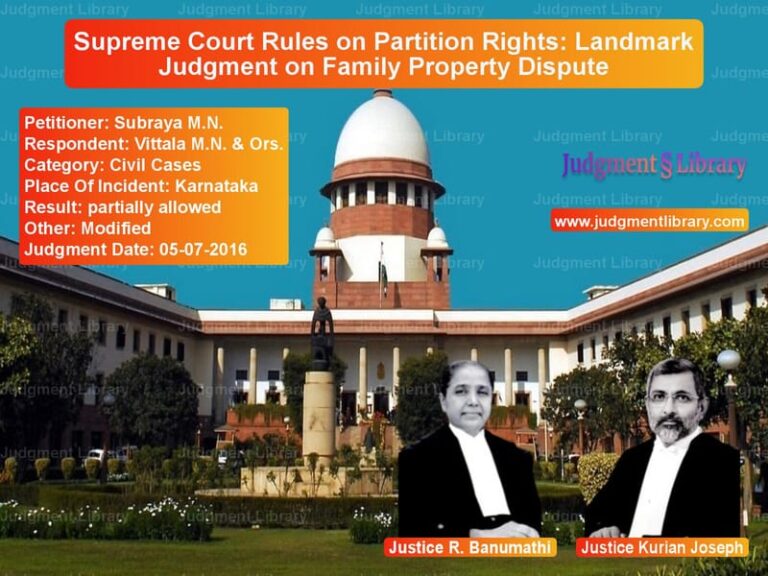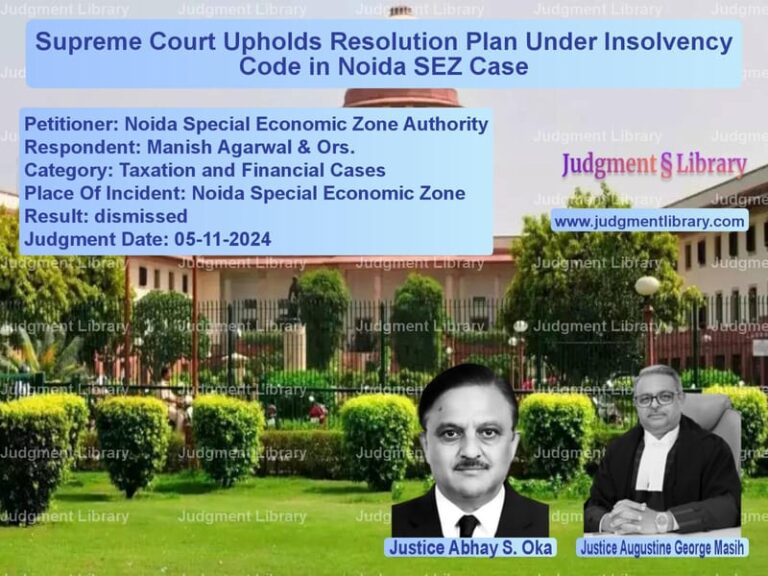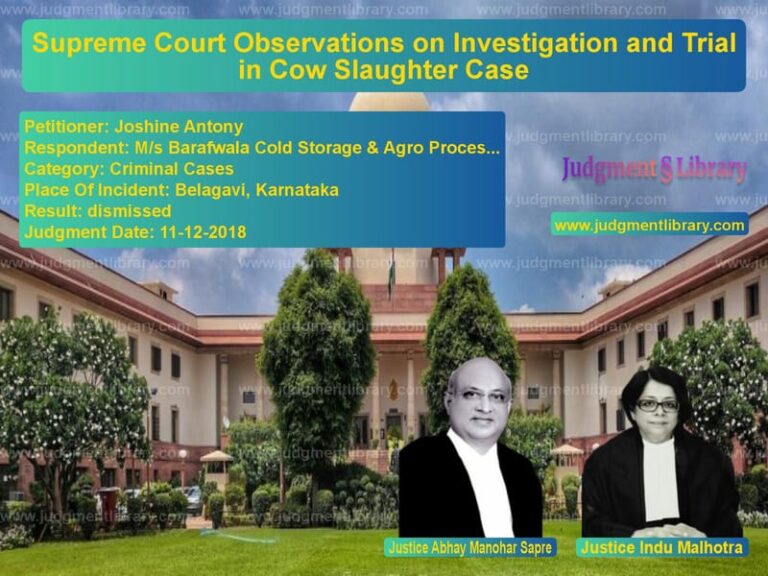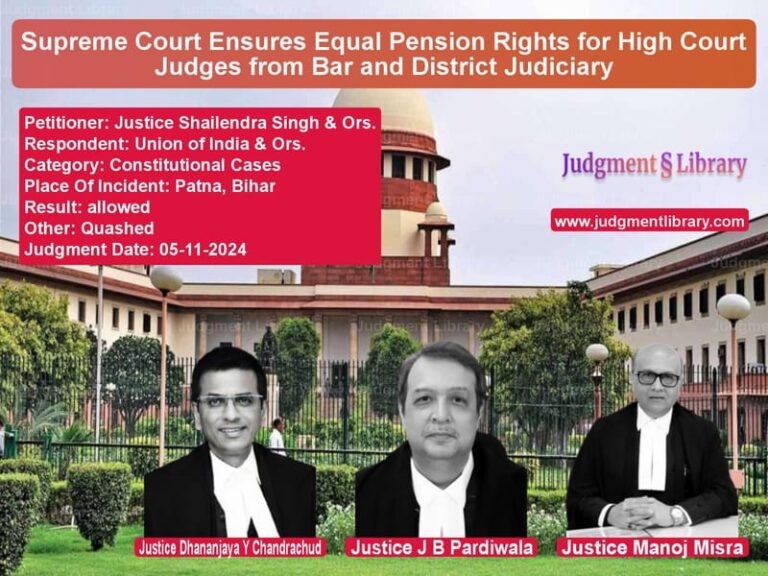Supreme Court Upholds Teacher’s Dismissal in Fake Transfer Order Case: Natural Justice Principles Explained
In a significant ruling that clarifies the application of natural justice principles in disciplinary proceedings, the Supreme Court of India recently upheld the dismissal of a Kendriya Vidyalaya teacher who had allegedly secured her transfer using a fake order. The case, which spanned over three decades of legal battles, provides crucial insights into how courts balance procedural requirements with substantive justice in service matters. The judgment delivered by a bench comprising Justice Abhay S. Oka and Justice Augustine George Masih reinforces that technical violations of procedure cannot automatically vitiate disciplinary actions unless they cause genuine prejudice to the employee. The Court’s detailed analysis of various legal principles, including the standard of proof in departmental inquiries and the true meaning of natural justice, makes this judgment a landmark in service jurisprudence.
The Case Background
The legal saga began in 1989 when S. Janaki Iyer was appointed as a Hindi trained graduate teacher on probation at Kendriya Vidyalaya Sangathan in Bangalore. She became a permanent teacher in 1992. Since her husband worked in Mumbai, she sought a transfer from Bangalore to Mumbai or Pune. In October 1991, a transfer order was issued that apparently transferred her from Bangalore to Mumbai. This order pertained to twelve teachers and was signed by Mr. VK Jain, Assistant Commissioner (Headquarters) of Kendriya Vidyalaya Sangathan in New Delhi.
Acting on this transfer order, the appellant was relieved from Bangalore on October 14, 1991, and reported to Mumbai on October 18, 1991. However, since the Mumbai school had not received the transfer order, she was initially asked to wait and was later permitted to join provisionally on October 24, 1991, with an undertaking that she would return to Bangalore if the transfer order was reversed or cancelled. The appellant noticed a discrepancy in her transfer order – she was mentioned as a Social Studies teacher instead of a Hindi teacher – and wrote to the headquarters seeking correction. Instead of receiving a response, she was placed under suspension pending disciplinary inquiry in July 1992.
The Disciplinary Proceedings
A chargesheet was issued to the appellant on February 10, 1993, alleging that she had “managed to get herself transferred from Kendriya Vidyalaya, Bangalore to Kendriya Vidyalaya, Bombay under a fake transfer order.” The appellant denied these allegations in her reply dated June 25, 1993. The disciplinary proceedings that followed continued for almost nine years, during which the appellant remained under suspension for an extended period beyond what was provided under the CCS (CCA) Rules, 1965. Her suspension was eventually revoked in March 2001, and she was directed to join at Baran, Jodhpur, though she never actually joined there.
The disciplinary proceedings concluded on March 30, 2001, with the disciplinary authority indicating that the transfer order dated October 1, 1991, was fake, and since the appellant was the sole beneficiary of this order, further proceedings should be held against her. The authority prima facie opined that the charges against the appellant stood true. The appellant submitted a detailed representation challenging these findings, but the disciplinary authority found her guilty and imposed the punishment of dismissal from service on November 16, 2001. Her statutory appeal was rejected on February 11, 2002, leading to a long legal battle through the Central Administrative Tribunal and the Bombay High Court, both of which upheld the dismissal order.
The Appellant’s Arguments Before Supreme Court
The appellant raised several grounds challenging her dismissal. “The primary ground taken for challenge to the Order of the Tribunal as well as the High Court is that Courts failed to appreciate the violation of the principles of natural justice, which were not allegedly adhered to by the Respondents due to the non-supply of the preliminary Inquiry Report, where prima facie the Appellant was found to have violated the rules governing the service.” She argued that the chargesheet served upon her was vague and prejudiced her defense.
The appellant also highlighted the inordinate delay of nine years in concluding the inquiry proceedings and claimed that certain documents she had sought were not provided to her. Another significant argument was that “the disciplinary authority, despite there being no findings against the Appellant in the Inquiry Report as submitted, proceeded to hold the Appellant guilty of the charge merely because she was the beneficiary of the said order and that too without any evidence establishing her connection with procurement of the said transfer order.” She also alleged violation of statutory rules, particularly Rule 15(2) of the CCS (CCA) Rules, 1965.
The Respondents’ Defense
The respondents supported the impugned judgments and the dismissal order, asserting that “the principles of natural justice and statutory rules were duly complied with as there being no prejudice caused to the Appellant.” They argued that the evidence, both documentary and oral, proved the charges against the appellant.
The respondents emphasized the difference in the standard of proof between disciplinary proceedings and criminal matters. “The principle which has been pressed into service is with regard to the standard of proof, where a preponderance of probability would operate to establish misconduct during the disciplinary proceedings vis-à-vis the proof beyond doubt as in criminal matters.” They contended that this burden had been discharged, and the findings of the Inquiry Officer and disciplinary authority passed the test laid down in various judgments and statutory mandates.
The Supreme Court’s Analysis
The Supreme Court conducted a thorough examination of all the grounds raised by the appellant, beginning with the challenge to the chargesheet’s vagueness. The Court observed: “A perusal of the chargesheet dated 10.02.1993 would show that not only did it contain the charges against the Appellant but the same was supported by documents as well. The charge against the Appellant was that she managed to get herself transferred from Kendriya Vidyalaya, Bangalore to Kendriya Vidyalaya, Bombay under a fake transfer order. In this respect, the language of the said chargesheet in our view is very clear and specific. A common man on going through the same, would understand as to what were the charges which an employee was called upon to face and defend.”
Regarding the non-supply of the preliminary inquiry report, the Court held: “The aspect with regard to non-supply of the copy of the Preliminary Inquiry Report again would not hold for long for the simple reason that it was never made the basis for coming to a conclusion in the regular Departmental Inquiry with regard to the guilt of the Appellant.” The Court noted that after the preliminary inquiry, a chargesheet was issued, and a regular departmental inquiry was conducted where both parties led evidence, and the Inquiry Officer returned findings based on that evidence.
The Court provided a comprehensive explanation of natural justice principles: “The principles of natural justice are founded on three fundamental rules that ensure fairness in legal and administrative proceedings. Firstly, the Hearing Rule (Audi Alteram Partem) which mandates that no person should be judged without being given a fair opportunity to present his case. Secondly, the Bias Rule (Nemo Judex in Causa Sua) which asserts that no one should act as a judge in its own case, thereby safeguarding impartiality and preventing any form of bias. Lastly, the principle of Reasoned Decision, also known as Speaking Orders, requires every decision to be supported by valid and clearly stated reasons to promote transparency and accountability in the decision-making process.”
The Court emphasized that “No prejudice having been caused because of the non-supply of the preliminary Inquiry Report to the Appellant, the plea of violation of the principles of natural justice would not be available to the Appellant. As a matter of principle, violation of the principles of justice cannot be on the touchstone of technical infringement made the basis of setting aside the action taken by the authority against an employee unless it is established that grave prejudice has been caused to an employee because of non-supply of a particular document.”
The Court cited the landmark Constitution Bench judgment in Managing Director, ECIL, Hyderabad and Others vs. B. Karunakar and Others, noting that “the doctrines of reasonable opportunity and natural justice to have been conceived and evolved not as a mechanical or a ritualistic formality, but as substantive principles intended to safeguard the rule of law and to facilitate the assertion of legitimate rights by individuals.” The Court further elaborated that “these principles are not to be invoked as mere procedural sacred words that have magical effect when said on every occasion, irrespective of context.”
Regarding the nine-year delay in concluding the inquiry, the Court found the respondents’ explanation justified: “The explanation as has been given by the Respondents with regard to the time consumed during the inquiry is fully justified as it had to be and actually was held at different places on different occasions as the matter related to different stations pertaining to the transfer orders of eleven teachers which were in question.” The Court noted that the appellant was regularly paid subsistence allowance and faced no hindrance in participating in the proceedings.
On the alleged violation of Rule 15(2) of CCS (CCA) Rules, 1965, the Court held: “The said procedure has been duly complied with and followed in the present case. The perusal of the inquiry report indicates that not only has the inquiring authority come to a definite conclusion that the transfer order was fake but has also concluded that the charges have been proved against her meaning thereby that she had managed to get herself transferred.”
The Court addressed the crucial evidentiary aspect: “As regards the submission that the findings as recorded by the Inquiry Officer with regard to the transfer order being fake are based on no evidence which could have been the only ground on which interference by the Court would be permissible also falls flat with an answer to the questionnaire served upon Shri VK Jain, the Assistant Commissioner in Kendriya Vidyalaya Sanghathan (Headquarters), New Delhi who is said to be the person under whose signatures the order dated 01.10.1991 was passed, when he had responded that the signatures on the alleged order dated 01.10.1991 had not been signed by him and it was not his signature.”
The Court emphasized the different standard of proof in departmental proceedings: “What has been stated above is that these are not criminal proceedings but departmental proceedings where the test with regard to the proof on the basis of evidence is different. The preponderance and probability being the touchstone in the departmental proceedings the same having been fulfilled, the plea as has been sought to be raised by the Appellant cannot sustain.”
Conclusion and Implications
The Supreme Court’s judgment provides significant clarity on several important aspects of service law. First, it reinforces that natural justice principles are substantive rather than merely procedural requirements – their violation must cause actual prejudice to warrant judicial intervention. Second, it affirms that departmental inquiries operate on the standard of preponderance of probability rather than proof beyond reasonable doubt. Third, it establishes that delay in departmental proceedings, unless unexplained and prejudicial, cannot automatically vitiate the proceedings.
The Court’s dismissal of the appeal underscores that employees cannot benefit from technical procedural lapses when substantial evidence supports the charges against them. The judgment also highlights the importance of properly pleading all grounds at the appropriate stage of litigation, as the Court refused to entertain the allegation of mala fides that was not raised before the lower forums.
This ruling serves as an important precedent for future cases involving disciplinary proceedings in government service, providing clear guidance on how courts should balance procedural requirements with substantive justice. It reaffirms that while natural justice is fundamental to fair administrative action, its application must be contextual and purposeful rather than mechanical and technical.
Petitioner Name: S. Janaki Iyer.Respondent Name: Union of India & Ors..Judgment By: Justice Abhay S. Oka, Justice Augustine George Masih.Place Of Incident: Mumbai, Maharashtra.Judgment Date: 20-05-2025.Result: dismissed.
Don’t miss out on the full details! Download the complete judgment in PDF format below and gain valuable insights instantly!
Download Judgment: s.-janaki-iyer-vs-union-of-india-&-ors-supreme-court-of-india-judgment-dated-20-05-2025.pdf
Directly Download Judgment: Directly download this Judgment
See all petitions in Disciplinary Proceedings
See all petitions in Termination Cases
See all petitions in Employment Disputes
See all petitions in Public Sector Employees
See all petitions in Transfers Cases
See all petitions in Judgment by Abhay S. Oka
See all petitions in Judgment by Augustine George Masih
See all petitions in dismissed
See all petitions in supreme court of India judgments May 2025
See all petitions in 2025 judgments
See all posts in Service Matters Category
See all allowed petitions in Service Matters Category
See all Dismissed petitions in Service Matters Category
See all partially allowed petitions in Service Matters Category






